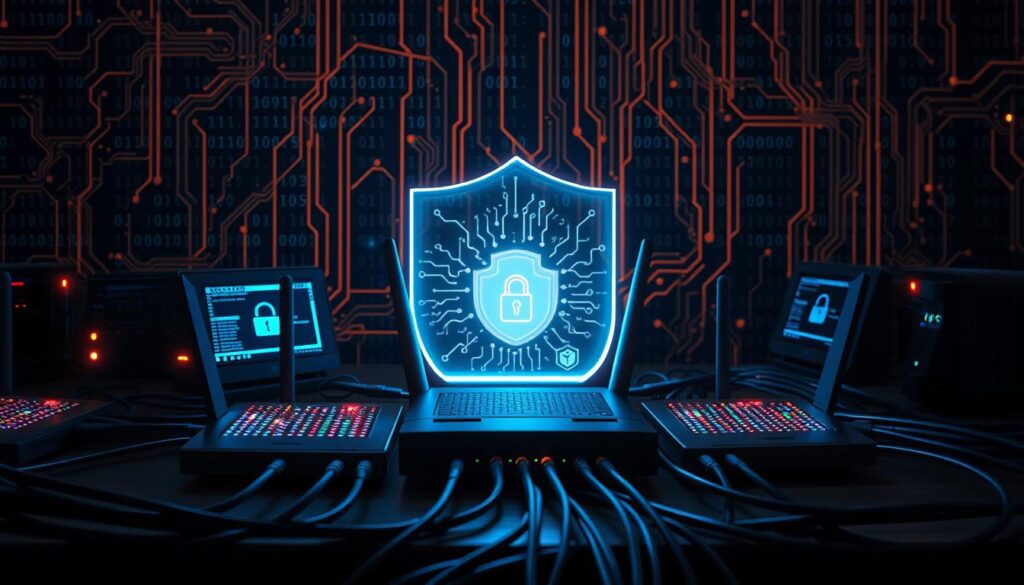
Protect Yourself Online: Mastering Internet Security
In today’s digital age, protecting yourself online is crucial. Cyber threats and data breaches are on the rise, making internet security a top priority. To stay safe, it’s essential to understand the importance of online protection and take steps to secure your personal information and online identity. This involves implementing effective cybersecurity measures to safeguard your digital life.
Mastering internet security requires a combination of knowledge and best practices. From creating strong passwords to using antivirus software, there are many ways to protect yourself online. By taking a proactive approach to cybersecurity, you can significantly reduce the risk of falling victim to online threats and ensure your personal data remains secure. Effective online protection is key to maintaining your digital well-being.
By prioritizing internet security and taking the necessary steps to protect yourself online, you can enjoy a safer and more secure digital experience. This includes being mindful of your online activities and taking measures to prevent cyber threats from compromising your personal information. With the right approach to cybersecurity, you can stay safe and secure in the digital world.
Introduction to Online Protection
Key Takeaways
- Internet security is crucial in today’s digital age
- Cyber threats and data breaches are on the rise
- Effective online protection requires a combination of knowledge and best practices
- Creating strong passwords is essential for cybersecurity
- Using antivirus software is vital for protecting yourself online
- Prioritizing internet security can help prevent cyber threats
Understanding the Basics of Internet Security
As we navigate the vast online landscape, it’s essential to grasp the fundamentals of internet security. The internet is a complex network of interconnected devices, making it a prime target for cyber threats. To protect ourselves, we need to understand what makes the internet vulnerable and the common online threats that exist. This knowledge will help us appreciate the importance of data privacy and digital security in safeguarding our online presence.
Some of the key factors that contribute to the internet’s vulnerability include the widespread use of network security protocols that can be exploited by hackers. Moreover, the increasing number of connected devices has created more entry points for cyber attacks. To mitigate these BUllet points:
- Malware and viruses that can compromise our personal data
- Phishing attacks that trick us into revealing sensitive information
- Ransomware that can lock our files and demand payment in exchange for the decryption key
By understanding these threats, we can take proactive steps to protect ourselves and our online identities. This includes implementing robust data privacy measures, suchhana as using strong passwords and enabling two-factor authentication. Additionally, staying informed about the latest digital security threats and best practices can help us stay one step ahead of cyber attackers.
In the next section, we’llowski delve deeper into the importance of creating strong passwords and explore the best practices for digital security. By taking control of our online security, we can ensure a safer and more secure online experience for ourselves and our loved ones.
Creating Strong Passwords That Actually Work
When it comes to online protection, one of the most critical steps is creating strong passwords. A strong password should be unique, complex, and difficult to guess, making it an essential tool for safe browsing. To achieve this, it’s recommended to use a combination of uppercase and lowercase letters, numbers, and special characters.
A good password should be at least 12 characters long and include a mix of characters, such as uppercase letters, numbers, and special characters. This makes it harder for hackers to crack the password using automated tools. Additionally, it’s crucial to use a different password for each online account, avoiding easily guessable information like names or birthdates.
Some tips for creating strong passwords include:
- Using a password manager to generate and store unique, complex passwords
- Avoiding common patterns or sequences, such as “qwerty” or “123456”
- Not using the same password for multiple accounts
By following these guidelines, you can significantly improve your online protection and ensure safe browsing. Remember, a strong password is just the first step in protecting yourself online, but it’s an essential one.
Essential Tools for Online Protection
To ensure robust web security, it’s crucial to have the right tools in place. This includes a combination of antivirus software, virtual private networks (VPNs), password managers, and two-factor authentication tools. These tools work together to provide a comprehensive layer of protection against various online threats, enhancing your overall information security and cybersecurity.
When it comes to cybersecurity, having the right tools can make all the difference. Antivirus software is a must-have, as it helps protect your device from malware and other online threats. Additionally, VPNs encrypt your internet traffic, protecting your online identity and ensuring that your data remains secure.
- Antivirus software options, such as Norton or McAfee, which provide robust protection against malware and other online threats
- Virtual Private Networks (VPNs), such as ExpressVPN or CyberGhost, which encrypt your internet traffic and protect your online identity
- Password managers, such as LastPass or 1Password, which help you generate and store unique, complex passwords
- Two-factor authentication tools, which add an extra layer of security to your online accounts
By using these essential tools, you can significantly enhance your web security, information security, and cybersecurity, protecting yourself from various online threats and ensuring a safe browsing experience.
Securing Your Home Network
To protect yourself online, it’s essential to focus on network security. Your home network is a critical part of your digital security, and securing it is crucial to prevent unauthorized access. This can be achieved by setting up a firewall, which acts as a barrier between your network and the internet, blocking malicious traffic.
Using strong passwords for your router and Wi-Fi network is also vital for network security. Avoid using easily guessable information, such as your name or birthdate, and opt for a combination of letters, numbers, and special characters instead. Regularly updating your operating system and software is also important, as it ensures you have the latest security patches and features.
A reputable antivirus software is another key component of digital security. It helps detect and remove malware, including viruses, Trojans, and spyware, which can compromise your network security. By installing and regularly updating antivirus software, you can significantly enhance your home network’s security.

Additionally, monitoring your network for suspicious activity is crucial. This can be done by tracking login attempts, monitoring data usage, and setting up alerts for unusual activity. By taking these steps, you can significantly improve your home network’s digital security and protect yourself from online threats.
- Set up a firewall to block malicious traffic
- Use strong passwords for your router and Wi-Fi network
- Regularly update your operating system and software
- Install and update reputable antivirus software
- Monitor your network for suspicious activity
By following these steps, you can ensure your home network is secure and your digital security is protected. Remember, network security is an ongoing process, and staying vigilant is key to protecting yourself online.
Safe Browsing Practices and Habits
When it comes to safe browsing, there are several practices and habits you can adopt to protect yourself online. One of the most important things you can do is to be aware of your surroundings and the potential risks that come with browsing the internet. This includes being cautious when clicking on links, downloading attachments, and providing personal information to websites.
In order to stay safe while browsing, it’s essential to have a good understanding of online protection and cybersecurity. This includes recognizing phishing attempts, managing browser settings, and using HTTPS connections. By taking these steps, you can significantly reduce the risk of falling victim to cyber attacks and protect your personal data.
- Being cautious when clicking on links from unknown sources
- Avoiding downloading attachments from untrusted websites
- Using strong, unique passwords for all online accounts
- Keeping your browser and operating system up to date with the latest security patches
By following these tips and staying informed about the latest cybersecurity threats, you can help protect yourself and your personal data while browsing the internet. Remember, safe browsing is an ongoing process that requires constant vigilance and attention to detail. By making it a habit, you can significantly reduce the risk of falling victim to cyber attacks and stay safe online.
Protecting Your Personal Data Online
As we navigate the digital world, it’s essential to prioritize data privacy and digital security to safeguard our personal information. With the rise of online transactions and social media, our data is more vulnerable than ever. To mitigate this risk, it’s crucial to implement effective measures for online protection.
A key aspect of protecting your personal data online is being mindful of social media privacy settings. By adjusting these settings, you can control who can see your personal information, thereby reducing the risk of identity theft and cyber attacks. Additionally, using data encryption methods can protect your sensitive data from being intercepted by unauthorized parties.
When it comes to online shopping, there are several secure online shopping tips to keep in mind. These include using reputable websites, avoiding public Wi-Fi, and monitoring your accounts for any suspicious activity. By following these guidelines, you can significantly reduce the risk of your personal data being compromised.
To further enhance your online protection, consider the following best practices:
- Use strong, unique passwords for all online accounts
- Enable two-factor authentication whenever possible
- Keep your operating system and software up to date
By prioritizing data privacy, digital security, and online protection, you can enjoy a safer and more secure online experience. Remember, protecting your personal data online is an ongoing process that requires vigilance and attention to detail.
Mobile Device Security Essentials
As we increasingly rely on our mobile devices for daily activities, ensuring mobile security is crucial. This involves taking several key steps to protect our devices and the sensitive information they contain. One essential measure is to use a reputable antivirus software, which helps to safeguard against malware and other online threats.
Another critical aspect of online protection is keeping our operating system and software up to date. This ensures that we have the latest security patches and features, reducing the risk of our devices being compromised. Additionally, using strong passwords for our device and online accounts is vital, as weak passwords can be easily guessed or cracked by hackers.
When connecting to public Wi-Fi, it’s highly recommended to use a Virtual Private Network (VPN) to encrypt our internet traffic and prevent eavesdropping. We should also be cautious when downloading apps and attachments from unknown sources, as they may contain malware or other security risks. By taking these precautions, we can significantly enhance our cybersecurity and protect our mobile devices from various threats.
Some key mobile device security tips include:
- Using a screen lock to prevent unauthorized access
- Regularly backing up our data to prevent losses in case of a security breach
- Being aware of phishing attempts and other social engineering tactics
By following these guidelines and staying informed about the latest mobile device security threats, we can enjoy the benefits of mobile technology while minimizing the risks. Remember, mobile security is an ongoing process that requires our attention and effort to ensure our devices and personal data remain secure.
Teaching Your Family About Internet Security
As we navigate the complexities of the digital world, it’s essential to ensure our loved ones are equipped with the knowledge to stay safe online. This includes educating them about online protection, cybersecurity, and digital security. By doing so, we can help prevent cyber threats and protect our family’s sensitive information.
When it comes to teaching our family about internet security, it’s crucial to consider age-appropriate guidelines. For younger children, this may involve explaining the basics of online safety, such as not sharing personal information with strangers or avoiding suspicious links. For older children and teenagers, this may involve more in-depth discussions about cybersecurity and digital security, including the importance of strong passwords and two-factor authentication.
Age-Appropriate Security Guidelines
- Establishing rules for online behavior, such as limiting screen time and monitoring online activity
- Encouraging open communication about online experiences and concerns
- Providing resources and support for staying safe online, such as online protection software and cybersecurity tools
By working together as a family, we can create a comprehensive family security plan that addresses our unique needs and concerns. This may involve implementing monitoring tools for parents, such as parental control software, to help track online activity and prevent suspicious behavior.

Conclusion: Staying Safe in an Ever-Evolving Digital World
As the digital landscape continues to evolve, the importance of maintaining robust internet security practices cannot be overstated. While the challenges may seem daunting, embracing the future with a proactive mindset can help ensure your safety and privacy in the ever-changing online world.
By staying informed about the latest cybersecurity trends and advancements, you can adapt your strategies to keep pace with emerging threats. Regular software updates, vigilant browsing habits, and a commitment to online protection will serve as your allies in navigating the digital frontier.
Remember, the key to thriving in this dynamic digital landscape lies in your willingness to learn, adapt, and continuously safeguard your online presence. With a well-informed and security-conscious approach, you can confidently navigate the future, embracing the boundless opportunities the internet has to offer.
FAQ
What makes the internet vulnerable?
The internet is a complex network of interconnected devices, making it a prime target for cyber threats. The internet’s vulnerability stems from its sheer size, the diversity of devices and technologies that make it up, and the constant evolution of new threats.
What are some common online threats?
Common online threats include malware, phishing, and ransomware. These cyber threats can compromise your personal data and online identity, leading to financial losses and other serious consequences.
Why is digital protection important?
Digital protection is crucial because it safeguards your online presence and prevents cyber attacks. By taking steps to secure your personal information and online identity, you can reduce the risk of falling victim to cyber threats and maintain a safe and secure digital experience.
What makes a strong password?
A strong password should be unique, complex, and difficult to guess. It should include a combination of uppercase and lowercase letters, numbers, and special characters. Avoid using easily guessable information, such as your name or birthdate, and use a different password for each of your online accounts.
What are some essential tools for online protection?
Essential tools for online protection include antivirus software, virtual private networks (VPNs), password managers, and two-factor authentication tools. These tools help protect your device from malware, encrypt your internet traffic, generate and store unique passwords, and add an extra layer of security to your online accounts.
How can I secure my home network?
To secure your home network, you should set up a firewall, use strong passwords for your router and Wi-Fi network, and keep your operating system and software up to date. Additionally, use a reputable antivirus software and monitor your network for any suspicious activity.
How can I recognize phishing attempts?
To recognize phishing attempts, look for suspicious email addresses, misspellings, and requests for personal information. Avoid clicking on links or downloading attachments from unknown sources, and be cautious when using public Wi-Fi networks.
How can I protect my personal data online?
To protect your personal data online, adjust your social media privacy settings, use data encryption methods, and follow secure online shopping tips. This includes using reputable websites, avoiding public Wi-Fi, and monitoring your accounts for any suspicious activity.
What are the essentials for mobile device security?
Mobile device security essentials include using a reputable antivirus software, setting up a screen lock, and using strong passwords for your device and online accounts. Keep your operating system and software up to date, use a VPN when connecting to public Wi-Fi, and be cautious when downloading apps and attachments from unknown sources.
How can I teach my family about internet security?
To teach your family about internet security, provide age-appropriate security guidelines, create a family security plan, and use monitoring tools for parents. This will help your family understand the importance of online safety and prevent cyber threats from affecting your household.